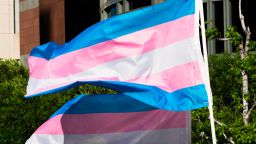Editor’s Note: Allison Hope is a writer whose work has been featured by The New York Times, The Washington Post, CNN, Slate and elsewhere. The views expressed here are the author’s. Read more opinion on CNN.
When my four-year-old recently told me that he liked his friend’s pink dress and wanted one of his own, I brought up a children’s clothing site on my phone and let him pick one out. It was a small gesture – the whole affair set me back roughly three minutes and $5.95 – but one that could mean a lifetime of affirmation for a child.

While it’s likely that my kid is a cisgender (non-transgender) boy who just likes to try on new things for size, whether a pink dress or a giant digger or that cool car his friend has, as a parent who is sensitive to gender inclusion, I actively work at every turn to ensure that he is able to feel free to explore his identity and outward expression. It’s also important that my child understand that toys and clothes and activities and behaviors aren’t inherently gendered or something to be policed. I want him to know that a boy can wear a dress and a girl can dig in the dirt and it’s entirely possible that someone can be sometimes more male and sometimes more female, or neither.
I teach my child these things because I know that it isn’t just about my kid feeling secure in his identity. It’s also about raising him to support and advocate for other kids to feel safe in theirs. If we want children to be able to truly explore and know themselves, we need all of the adults who influence them to wake up to the ways – some obvious, others subtle – our society imposes rigid gender binaries and limited forms of identity and self-expression.
June is Pride Month. This is a time when those of us who identify as LGBTQ can shimmy further away from the shame, exclusion, trepidation and self-consciousness that we are constantly battling from a world that doesn’t make room for us, let alone celebrate us. For me, it’s also a time when I am thankful for my family’s ability to raise our son with the freedom of gender expression that all children deserve. It makes me long for all children to have the extended community of family, teachers and caregivers who support us – and other kids – in this endeavor.
If only all grandmas could be like my mother-in-law, who corrected her husband when he told his grandson that “boys don’t cry.” “Yes, boys do cry,” she said. “It’s OK if you have to cry.”
If only all teachers could be like my child’s. They actively encourage the preschool students to rotate who they play with, so kids are less likely to feel excluded and get time to play with kids of different genders. If only all parents could be like the parents in my kid’s class, who are not LGBTQ like we are but who proactively ask the teachers to diversify activities so that the kid who only wanted to play with the trucks and blocks was also encouraged to do crafts and play with dolls and vice versa.
If only all religious leaders could be like the pastor of the LGBTQ-affirming church where our child attends school, who reads books, sings and talks to the children about topics like being who you are and loving one another and who has welcomed our LGBTQ family with open arms and zero judgment.
If only all friends and family could be allies like the ones I am so grateful to have in my orbit, who plant lawn signs for LGBTQ Pride, run fundraisers to support LGBTQ youth, light up their social media with rainbows.
If only all our elected representatives could be like the ones I have been privileged to have, who actively fight against harmful measures that aim to strip LGBTQ people, and transgender children in particular, of what rights and freedoms we hold, including those we fought long and hard for and which are constantly under threat.
If only all kids’ programming could be like “Sesame Street,” which welcomed the incredibly fabulous and inspiring “Pose” star and HIV-positive gay man, Billy Porter, to don a dress and sing with puppets about friendship for millions of kids to see.
Whether you are a babysitter, a teacher, doctor or nurse, neighbor, aunt or uncle, or anyone else who may not have children but who interact with them on a regular basis, what you say and how you show up matters. Anyone who interacts with children for any reason – as a store clerk, a receptionist, the lunch lady or a neighbor – can say or do something that can have ripple effects deep enough to cut or heal a child for a lifetime to come. Treating those moments with kids mindfully and deliberately can make all the difference. We know that having just one LGBTQ-affirming adult in a kid’s life can prevent suicide and literally save a life, according to a 2019 study out of the Trevor Project, an anti-bullying organization.
Being an ally to a child who or may not be LGBTQ-identified now or in the future, means first taking the time to get educated and unpack some preconceived notions you might be carrying about gender identity and expression. Then do what you can to actively show support for those children in your life by first leading with love and then doing more listening than talking. Speak up if you hear others say something potentially harmful. Oppose the rash of bills that are targeting transgender children and have no merit.
Those of us marking Pride savor this month to lean into moments, however fleeting and at times superficial, when we are enveloped in affirmation. It’s that rainbow Pride sign hanging in the front window of our favorite store. The Google animation that blasts rainbow confetti when searching for the Pride event lineup this year. The social media rainbow filter that so many friends have adopted to show their love and support. It’s political leaders proudly flying rainbow flags from government buildings without hesitation. It’s the drag queen story hours and the hand-crafted signs at the political marches. It’s A-list celebrities standing with us. It’s Republicans who take an unpopular stance with their own party.
Those of us who are LGBTQ adults grew up in an even more hostile world than the one children face today.
Get our free weekly newsletter
We must take these actions and more to support our children, particularly those who are caught between a politicized present and a future that is certain to be more open to fluidity and life beyond the binary (Gen Z already believes there should be more than two gender options). Kids’ experiences vary tremendously depending on where they live and who is in their home and circles of influence (I know most kids aren’t as fortunate as mine), and that makes it even more urgent that we create welcome and inclusive spaces for them and stand in as strong allies so that they can be free to evolve into their beautiful, full selves.
It’s not hard. But it is necessary. We all have a role to play.






